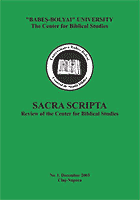The prologue of the fourth gospel:encounter of the greek philosophicalthought and the judaic tradition
The prologue of the fourth gospel:encounter of the greek philosophical thought and the judaic tradition
Author(s): Korinna ZAMFIRSubject(s): Christian Theology and Religion
Published by: Universitatea Babes-Bolyai - Centrul de Studii Biblice
Summary/Abstract: The study analyzes the use of the concept of logos in the Fourth Gospel as a model of “Wirkungsgeschichte,” from Heraclitus, who perceives the logos as gathered, ordered existence, through Plato, understanding existence as hidden reality brought forth and made visible by the logos. Dissociation between existence and logos occurs by Aristotle, where the logos expresses the truth of being. This process reaches a turning point in the philosophy of the Stoa, where the Logos becomes the rational creative principle, the universal spirit, serving as model for the creation. Wisdom literature constitutes an initial moment of the syntheses of Judaic tradition and Greek philosophy. A later significant stage occurs in the writings of Philo, who describes the Logos as the reason and the word of God, the archetype of the created world and of the human soul. Philo constantly uses the personification of the Logos, called God’s eldest or first-born son. This Logos-hypostasis as cosmological principle, as self-expression of God will have later a significant influence. In the Prologue we witness an early process of inculturation. The author, while transmitting the gospel in a particular spiritual-cultural environment, and in order to state with a previously unknown clarity the pre-existence and divinity of the Son, used concepts and ideas known and understood by his audience, in order to speak about Christ: the Logos and the personified Wisdom.
Journal: Sacra Scripta
- Issue Year: I/2003
- Issue No: 1
- Page Range: 128-157
- Page Count: 30
- Language: English
- Content File-PDF

